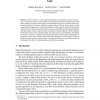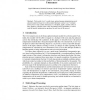339 search results - page 3 / 68 » Basic concepts of abstract interpretation |
DLOG
2006
13 years 7 months ago
2006
Abstract. Model checking is a fully automated technique for determining whether the behaviour of a finite-state reactive system satisfies a temporal logic specification. Despite th...
ICASSP
2009
IEEE
13 years 3 months ago
2009
IEEE
In the context of spoken language interpretation, this paper introduces a stochastic approach to infer and compose semantic structures. Semantic frame structures are directly deri...
CIMCA
2006
IEEE
13 years 11 months ago
2006
IEEE
Abstract. We describe Scusi?, a multi-stage, spoken language interpretation mechanism designed to be part of a robot-mounted dialogue system. Scusi?’s interpretation process maps...
JAIR
2006
13 years 5 months ago
2006
A multiagent system may be thought of as an artificial society of autonomous software agents and we can apply concepts borrowed from welfare economics and social choice theory s t...
EUSFLAT
2009
13 years 3 months ago
2009
Abstract-- An L-fuzzy context is a triple consisting of a set of objects, a set of attributes and an L-fuzzy binary relation between them. An l-cut is a classical context over the ...


